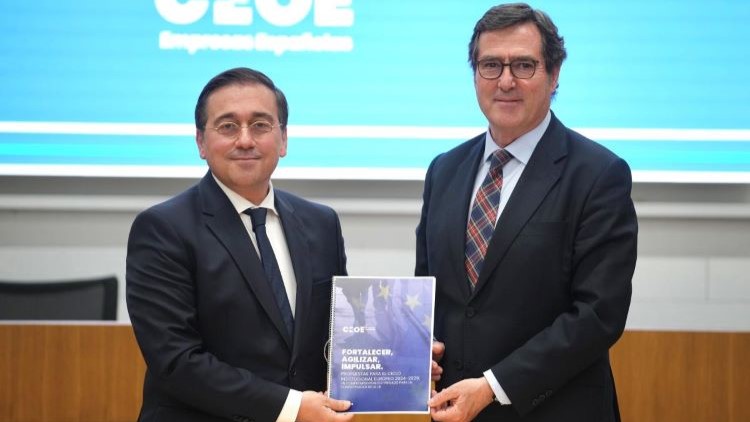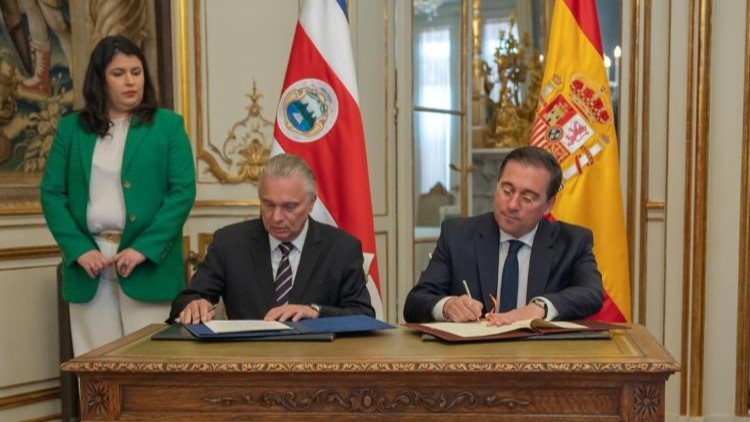The Diplomat
The Spanish Confederation of Business Organizations (CEOE) yesterday presented to the Minister of Foreign Affairs, José Manuel Albares, his proposals to convert competitiveness into the axis of EU policies in the new European institutional cycle.
The event took place during the Spanish Perspective on the next EU Strategic Agenda 2024-2029 meeting, organized by the CEOE at the organization’s headquarters in Madrid and in which the president of the association, Antonio Garamendi, presented to Albares his proposals for the new European institutional cycle 2024-2029, encompassed under the motto Strengthen, streamline, promote. “In a context of growing geostrategic rivalry and strong international competition, promoting European competitiveness is essential to achieving a stronger EU,” the document highlights.
“At CEOE we are convinced that the period 2024-2029 represents an opportunity for the Union to place competitiveness and economic growth at the center of its policies,” declared Antonio Garamendi. “We are convinced that increasing the competitiveness of our companies and our economies is crucial to being able to face the most significant internal and external challenges that we are currently facing,” he added. “This strategy is necessary to, from there, be able to develop our shared commitment to a social and ambitious EU from an environmental point of view,” warned Garamendi.
In the opinion of the president of the CEOE, “the commitment of public entities, Spanish and European, and of companies with public-private collaboration must be a cornerstone” to achieve these objectives during the next European cycle, in which “it is “It is essential to continue promoting Spain’s role in the EU and ensure that our strategic priorities as a country are for the EU as a whole and are reflected in the European agenda for the next five years.”
For his part, Albares declared that the proposals presented by CEOE “provide content to the reflection work of the coming months, contributing to strengthening, streamlining and promoting the single market.” On this effort, he warned, “the future of Europe will largely depend, because when we talk about competitiveness or the market, we talk about citizens, we talk about prosperity, well-being and employment.” “For all these reasons, we must renew our commitment to the single market, with its construction and deepening,” he added.
The CEOE proposals for the new European cycle are articulated around nine axes of action: the establishment of a regulatory framework for competitiveness, measures to complete the single market as a central priority, the creation of an economic and fiscal environment that promotes investment, the green transition (according to the CEOE, “Spain can become a strategic hub for the decarbonization of the European economy and for the development of the circular economy”), the digitalization of the economy, the promotion of innovation as an axis of competitiveness and the Europe of social dialogue and job creation.
“A strategic Spain in an agile institutional framework”
The eighth axis focuses on the need for “a strengthened foreign policy and an open trade and investment policy” in areas such as the EU’s support for multilateralism as the best way to address existing global challenges, strengthening the security of the EU in all its aspects, the adoption of economic measures that balance the promotion of the EU and the search for international partners, the promotion of an open investment and trade agenda, the strengthening of trade relations with key partners (such as the US, China , Latin America and the Caribbean), the deepening of relations with the EU’s neighboring countries (such as the United Kingdom, Switzerland or North Africa) and the preparation of the EU for future enlargements.
Finally, the document that Antonio Garamendi delivered to Albares includes measures to consolidate “a strategic Spain in an agile institutional framework.” The objective of this point is that “the challenges and strengths of the Spanish economy are axes of the European agenda”, which must be accompanied by “the necessary institutional space in the College of Commissioners and the organizational chart of the European Commission and a positioning strong and proactive of Spain in the negotiations in the Council of the European Union.”







